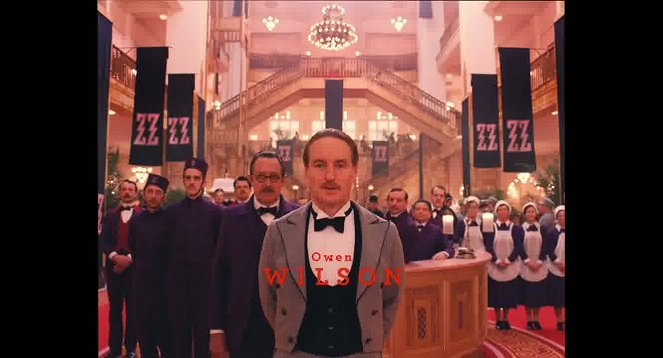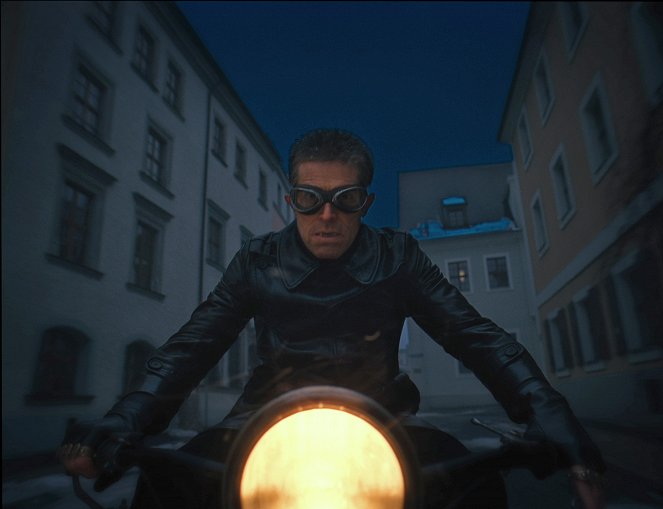Réalisation:
Wes AndersonScénario:
Wes AndersonPhotographie:
Robert D. YeomanMusique:
Alexandre DesplatActeurs·trices:
Ralph Fiennes, F. Murray Abraham, Mathieu Amalric, Adrien Brody, Willem Dafoe, Jeff Goldblum, Harvey Keitel, Jude Law, Bill Murray, Edward Norton (plus)VOD (4)
Résumés(1)
THE GRAND BUDAPEST HOTEL retrace les aventures de Gustave H, l'homme aux clés d'or d'un célèbre hôtel européen de l'Entre-deux-guerres, et du garçon d'étage Zéro Moustafa, son allié le plus fidèle. La recherche d'un tableau volé, œuvre inestimable datant de la Renaissance et un conflit autour d'un important héritage familial forment la trame de cette histoire au cœur de la vieille Europe en pleine mutation. (20th Century Fox FR)
(plus)Vidéo (15)
Critiques (19)
Un cahier de coloriage ludique, traditionnellement exclusivement original d'Anderson. Une histoire captivante et rapide mettant en scène des personnages intéressants, interprétée brillamment par un groupe d'acteurs apprécié. Je suis heureux que le film ait également réussi commercialement aux États-Unis, son créateur unique le mérite.
()
La poétique étrange et inédite de Wes Anderson continue de faire rire, d’émouvoir et de nous procurer une expérience cinématographique de qualité. Ralph Fiennes brille littéralement dans le rôle principal, les autres acteurs préférés du réalisateur recevant plus ou moins d’espace. Les films de Wes Anderson ne sont pas pour tout le monde, mais il est certain qu’il a établi une solide réserve de fans au cours des années.
()
Wes Anderson is a director with his own world. I’ve seen his world a few times before and I never liked it as much as I did in this movie. It may have been caused by the atmosphere of the Second World War, but I rather think it was the absurdity as such, that the director toys with in this war. It’s a bit like Tarantino’s Inglorious Basterds, only in the far more distinctive and positive style of the director, which I’ll probably never forget. And I have to admit, after watching this movie, I immediately have a reason to watch all his other movies I’ve seen before, but also the ones I haven’t seen yet. That’s how much The Grand Budapest Hotel affected me.
()
The cardboard world of Anderson's childish fantasy hooked up with a script someone dug up in Alfred Hitchcock’s forgotten archives, and I’ve definitively succumbed to this fool whose films I both liked and loathed at the same time. While it doesn't really have human emotions, but rather forcefully screwed-on tremors based on the situation the characters are in at the time, this thriller ride is as tense as anything else. The elevator scene at the end and the subsequent shootout in the gallery are both scenes that few people can really film today. PS: Most directorial aces would sell their souls for this casting.
()
A lot of figures, no characters. A lot of narrators, no narrative. A lot of movement, no direction. Anderson again balances on the edge of a chasm of gratuitous horsing around in grand style. The design of the individual settings and periods (red and purple art deco in the 1920s, grey and pink during the Nazi era, orange and yellow in the 1960s), the geometric perfection in the mise-en-scene and the seemingly hand-crafted tricks make up an unbelievably entertaining blend of the poetics of classic slapstick and Méliès’s more spectacular films. (A detail for connoisseurs is the fact that each era was shot in a different aspect ratio: 1.85:1 for the present, 2.35:1 for the 1960s, academic format for the 1930s). However, I don’t agree that Anderson has matured and has given us a sad and melancholic film in colourful wrapping. Any attempts at seriousness fail, whether in relation to the characters or to the theme of war and times long past. The war context, the hint of nostalgia and the multiple rewritings of Central European history serve mainly as an excuse for colourful fooling around. Zweig is present more or less thanks only to the nesting-doll structure of the narrative, the infrequent consideration of which over the course of the film raises a question that I had to ask myself repeatedly, despite my desire to let myself be freely carried away by Anderson’s imagination – “What is this for?” According to the principle of “why do something the easy way when you can do it the hard way”, the film contains a full range of prototypical situations that we would find in their unaffected form, which would better serve the story, in classic escape and caper movies. The acknowledged inspiration taken from Hitchcock’s thrillers (a persecuted innocent) and Lubitsch’s screwball comedies from obscure European countries (particularly Ralph Fiennes’s character and his attitude toward women, but not the “cleverness” of the dialogue, whose humour rather often consists in a wager on a sure thing in the form of well-timed vulgarity) is purely superficial. The intentional contrivance of the situations finds a response only in the actions of the characters, who respect strict rules and walk in diagonal lines, thus elegantly closing the circle, as the contrived world gives meaning to its lifelessness through artificial figures. I admire the precision with which Anderson builds his worlds and I enjoy the flawless comic timing of all of the actors, but I simply cannot find any deeper meaning, greater depth or narrative imaginativeness in Grandhotel Budapest. 75%
()



Annonces